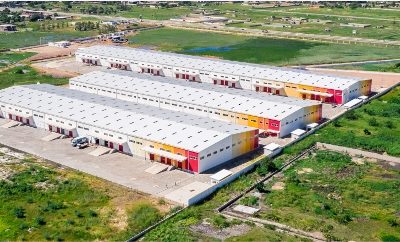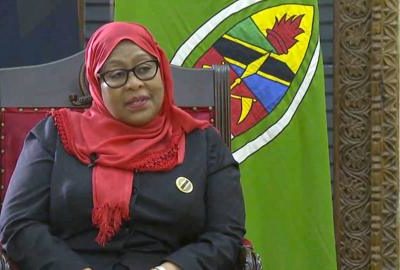Freetown is longer booming with guns and Sierra Leoneans are more focused on building a future beyond the agonies of wars. You will find the testimonies in the new ICT companies. SEGUN ORUAME.
Years of Siege
Parts of Freetown’s outstanding landmarks are the ‘Lion Mountains’ or more appropriately, “Lioness Mountain”, Portuguese Sierra Leone from which Sierra Leone derived its name. And then the sea that completely surrounds the city. Both are fascinating tourist items but none is as compelling as the almost zero crime rate country trying to get over the pains of war. Since the guns stopped booming, Sierra Leoneans are working at getting the economy to boom again in the post war years with inflation standing at about 15%. It is the best Sierra Leoneans can get for now with high hopes that as every facet of the economy picks up, the sea would sing again as it laps up the mountain.
Sierra Leone and neighbouring Liberia are painful reminders of some of the saddest periods in West African recent history. More than a decade of war, thousands of deaths, destroyed infrastructures, millions living with broken limbs, disorganized social structures and ruined economies are the sordid pictures of the consequences of failed leaderships.
Hope Returning
But things are gradually picking up. In Freetown, optimism is infectious. The state-owned Electricity Company is perhaps, the most erratic on the sub region. But its disappointing performance has not been able to kill a re-kindled confidence by Sierra Leoneans that the economy would pick up again. One of the areas, you could easily gauge this upbeat is the ICT sector, particularly the mobile sub-sector where more than five operators fight for space.
Authorities are seeking to have more licenses issued to intensify the competition. Celtel and Comium lead the market, each controlling more than 150,000 subscribers to give the two operators a combined grip of the market in excesses of 90%. Of the two, Celtel is touted as having a higher number of subscribers. But the Tigo brand is roaring and could have a good pounce that could see it reducing the tally for Sierra Leone’s two mobile kings.
However, the success in the mobile sector is only a part of the post war toffee tales. The ICT sector is small but is pulsating in this country of five million people. It is all too easy to dismiss Sierra Leone as too small and less tempting for big risks and big gains. But that would be a narrow perception of a green market waiting to reward investors who would dare to berth. Sierra Leoneans themselves are returning in droves from the diaspora to rebuild their country and lead the growing number of investors prospecting for gains in the land of the Lion Mountains.
As in other parts of the continent mobile telephone companies and other ICT providers are gradually becoming the new drivers of the economy, exploiting fresh business opportunities to change the long held perception that only the mining industry could sustain the country. Sierra Leone is rich in diamonds that has always been the major source of hard currency for this former British colony which capital, Freetown, was founded in 1792 by the Sierra Leone Company as a home for Black Britons who had fought for the British in the American Revolutionary War.
Diamond curse
Before the war came, Sierra Leone has fallen into the same trap as its bigger ECOWAS sister country Nigeria of believing that mineral wealth could sustain the national economy. Nigeria is the continent’s leading crude oil producer. And like Nigeria, it has the disheartening condition of having a population majority of which are engaged in subsistence farming not enough to feed the domestic market and forcing the economy to be depended on agricultural import.
About two-thirds of Sierra Leonean population “engages in subsistence agriculture, and despite the fact that most Sierra Leoneans derive their livelihood from it, agriculture accounts for only 42% of national income. As of 2003, the government was trying to increase food and cash crop production and upgrade small farmer skills. Also, the government works with several foreign donors to operate integrated rural development and agricultural projects”. Like Nigeria, dependence on mining of a mono export commodity has altered economic growth for the worst.
One report on Sierra Leone observes: “Economic development has always been hampered by an overdependence on mineral exploitation. Successive governments and the population as a whole have always believed that “diamonds and gold” are sufficient generators of foreign currency earnings and lure for investment. As result large scale agriculture of commodity products, industrial development and sustainable investments have been neglected by governments. The economy could thus be described as one which is ‘exploitative’ and based on the extraction of unsustainable resources or non-reusable assets”.
Diamond was also one of the major factors that contributed to the sustainability of the country’s 11 years’ war. Read this report “though rich in this resource, the country has historically struggled to manage its exploitation and export. Annual production estimates range between $70-$250 million; however, only a fraction of that passes through formal export channels (1999: $1.2 million; 2000:$16 million; 2001: projections $25 million). The balance is smuggled out and has been used to finance rebel activities in the region, money laundering, arms purchases, and financing of other illicit activities , leading some to characterize Sierra Leone’s diamonds as a ‘ conflict resource’.
After storm, thunder
After the war, things are slowly but steadily changing. There is a greater push to seek for national economic fortunes outside of the diamond fields. For instance, the Chinese, some of the early bird investors, are investing millions of dollars to explore the plethora of tourist opportunities in this very fascinating country. Nature has endowed Sierra Leone with an irresistible beauty that would bring in tourists.
Inside Freetown, the ICT companies are springing up almost every other month. They range from the providers of internet services, ICT training, network installation website hosting to financial and business software and hardware vending. A small number have been around before the war, but after the war a growing number of solution providers are coming to berth. Many are young Sierra Leoneans living abroad, inspired by a sense of patriotism to move their country forward using ICT tools.

“We have to grow this country again and also move it forward alongside other countries thinking of entering the information age”, said Evelyn Lewis, CEO of SBTS Group, which service offering includes biometric Solutions, ICT Consulting, database management, elearning and training. The SBTS Group has been able to create new opportunities for young Sierra Leoneans itching to acquire specialized ICT skill and also a window of to deploy those skills.
Civil conflicts over, the business climate still suffers from uncertainty and a shortage of foreign exchange but investors are protected by an agreement that allows arbitration under the 1965 World Bank Convention Legislation provides for transfer of interest, dividends, and capital to allow investors full guaranty for repatriation of their investment. Government desires to do more to instill confidence in the international investing community and prod capital import.
For the government of President Kabbah, rebuilding Sierra Leone has demanded rekindling trust and ending mutual political suspicion among the local communities, restoring confidence in Sierra Leoneans to believe in themselves and struggling with the task of putting socio-economic structures in place. Achieving all these, have of necessity requires, going down on bended knees to get “significant amounts of foreign assistance, principally from multilateral donors. The bilateral donors include the Unites States, Italy and Germany, the largest being the United Kingdom and the European Union”.
Inside the Bretton Wood institution, it is held that “Sierra Leone’s short-term prospects depend upon continued adherence to International Monetary Fund Programme and continued external assistance. That is not completely true as the bustling economies of China and India have shown. Sierra Leone’s economy would need prudent managers. But it would need visionaries with desires to rework the economy outside of diamonds and a deep faith that this country of five million people could have a new destiny based on ICT. It is the mantra for Lewis and the small but growing army of young indigenous, investors inside Freetown. For them, Sierra Leone’s only chance of playing catch up with the rest of the world is deployment and fast uptake of ICTs. And only Sierra Leoneans can make this happen by being in the fore-front of this change.
Complete Solutions
Complete Solutions is a specialist business solution consultancy registered in Sierra Leone with “the knowledge and experience necessary to deliver appropriate solutions at an affordable budget”. Since founded in 2003 as an IT consultancy and software house specializing in Sunsystems financial and business software, it has grown to become one of Sierra Leone leading ICT companies.
Complete Solutions has established its global network and created strategic partnerships with leading global IT organizations. Its service offerings include: systems analysis, design, integration and development; software development and application support in which it builds and develops tailor made applications for organizations; accountancy packages SunSystems 4, Dataflow 32 and Sage L50 and L100 and Quickbooks Pro and Quickbooks Accountant.
Byte and Wireless Consultants Limited (BWCL)
Byte & Wireless Consultants started as an indigenous Sole Proprietor one-man show in April of 2000. The business actually sprang into being by the encouragement of good friends for whom the executive Director had worked with and for. The business grew up to staff strength of seven (7) full time employees and an impressive portfolio of Clients. After five (5) years there was a need for expansion. There was a transformation from a sole proprietorship to a limited company in April of 2005. Thus, Byte and Wireless Consultants Limited was born. Over the past eighteen (18) months, the growth has been exponential. The company has doubled the staff strength and the clientele keeps growing. There are two major departments namely: IT Consultancy and Training.
The SBTS Group
Evelyn Lewis and his wife Roselyn run the SBTS Group. An idea that started in the United States where the couple met. Since coming home to set up the Group, they have gone through the circle of setting up and sustaining an initiative that is a mix of business and humanitarian calling. They have passed through the phase of nurturing group from an idea that could work in Sierra Leone to sustaining a project that has come to stay in the face of intimidating challenges. The SBTS Group virtually runs on diesel generator 24/7. But Lewis and his team exude an infectious confidence in the ability of the Sierra Leonean economy to overcome the post war fatigue and also grow in a new direction fired by ICT.
They have grown the group to become a total It solution company spread across three continents: Asia, America and Africa. There is an office in India and in Africa, they are looking at setting up in Abuja and Lagos outside of Freetown, of course, it all started at the US, so the first office was in the States. Areas expertise include: Biometric Solutions; ICT Consulting; Web Development; E-Solutions; E-Government; Software Development; Database Management; Networking; Systems Integration; E-Learning; Training and Support Management.
Since it started business, it has a formidable list of clients that include: government and private sector players. The list include: the National Social Security Insurance Trust of Sierra Leone , the 120,000 members of the National Association of Social Workers, the Sierra Leonean embassy in Washington DC, and the Sierra Leone Homecoming Website and database. It has also performed consulting and training for various departments of the US government including the Department of Defense and Department of Commerce among others. SBTS also supported numerous mainframes systems for the Department of the Treasury under our U.S sub-contract involving system comprising of hundreds of database servers. In Sierra Leone, it has provided advance level training consultation for staff members of the National Institutes of Health (NIH), customized Loan Management software package for the Housing Assistance Council. This software package manages and tracks payments made by HAC clients on their loans. It’s new office in India is looking up and roaring to go as it spreads its client base across the three continents.

The group has developed several off-the-shelf programmes including Trainingsol, which helps as a partner to training managers and coordinators in automating training management with ease. Other solutions, FIN ACT and FIN ACT Verifier serve as tools for managing the process of money transfer from United States to locations outside of the United States. SBTS Group has also developed an online reservation system, which can be used for various reservation mechanisms.
The SBTS Group is on aggressive pursuit of ensuring adoption of biometric solutions not just in Sierra Leone but across the ECOWAS sub-region. The solution is geared at helping organizations use the physiological characteristics of an individual to verify that ‘they are who they say they are’. The solutions enable the registration of citizens for drivers’ licenses, national identification programmes, prevention of identity fraud, access control and criminal investigations. Its ICT Consulting arm has a pool of talents to help organizations get the best of services that include analysis, design, planning, engineering, installation, maintenance, opration, security and management. In areas ranging from e-commerce, web design, database management, web development, help desk management, local and wide area network support (Windows, UNIX and other IP network topologies), software system support, computer system operations support, networking, VPN and Wireless connection.
SBTS Group provides you with the expertise you require to design, implement and maintain your network. SBTS will work you to determine your networking needs, provide you with an analysis, design the network, implement the network and maintain it. We provide you with the most up to date technology and the people to support it.
Software Management
SBTS Group has Information technology talent to perform proper analysis of your software needs. Design a system, deploy the software, support and train your staff. SBTS Group has developed several software packages including FIN ACT a money transfer system, an airline reservation system and training and loan management software. Contact us today with your business requirements.
Database Management
SBTS Group provides our clients with comprehensive database consulting and management, from analysis to design and maintenance; we are your database manager. SBTS staff members are experts in Microsoft SQL, Oracle, Access and other database languages. Our management system allows for database administration, backup and recovery. Our paramount concerns are the security, reliability and redundancy of your information. SBTS Group will provide you with your database management solutions and train your internal staff on all the necessary processes.
Networking
SBTS Group provides you with the expertise you require to design, implement and maintain your network.
System Integration
Our approach to the challenges of business and technology is a holistic one. Our systems integration expertise employs and integrates proven, scalable high technology solutions that take your business to the next level.
E-Learning
SBTS Group can create an e-learning solution for your organization. We can create or use your own course content or create content for you based on your requirements. Our customized approach enables your organization to conduct a need analysis of your training requirements and translate that into a software package that enables self-paced learning. Take advantage of over 1700 courses using our e-learning tool- Trainingsol.
Training
With over 200 courses, SBTS Group offers premier hands on training services to all our clients. We become your in-house training department. We specialize in computer training at various levels from basic end user courses such as the Microsoft Office Suite (word, Excel, PowerPoint, Outlook, Access) and the more complex high-end courses such as : Windows 2000-03 Server and client systems, MS SQL, Oracle, CISCO, Java programing and many more. The success of our classes resides in the experience and professionalism of our instructors who have a minimum of four years teaching experience. We also offer database, networking, graphics and web development classes amongst other.
Support Management
SBTS Group offers a variety of support services related to software design, development, maintenance and analysis. As part of our services, we deploy personnel to support data center operations, help desk, software systems and engineering support services. We are knowledgeable in integration, operation, maintenance, data backup and recovery, performance tuning, continuous monitoring and end-user support. SBTS Group can provide the necessary training so that your internal staff can provide you with support.































